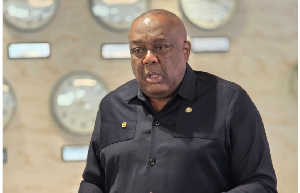Ghanaians consume about 225,287 tonnes of bush meat worth 205 million US dollars annually, Nana Kofi Adu-Nsiah, executive director of the Wildlife Division of Forestry Commission, has said, in Techiman in Brong Ahafo. At a forum on the closed season for hunting, covering August one to December one, he said the country's annual volume of bush meat harvested by hunters was, however, 384,992 tonnes worth 350 million US dollars.
The forum was organised by the Wildlife Division under the theme, "Ensuring Sustainability of the Bush Meat Trade." Techiman is a major national trading centre for bush meat.
Nana Adu-Nsiah noted that bush meat contribute immensely to the national economy; protein nutrition and household incomes and is considered more important than any other local meat.
He said at the endorsement of the United Nations Millennium Development Goals in September 2000 in New York, participating governments were urged to integrate the principles of Sustaining Development into policies and programmes to reverse the loss of environmental resources including wildlife.
The executive director, however, stated that though the Division did not subscribe to a total ban on bush meat production it believed that the principles of the closed season should be understood and observed.
Nana Adu-Nsiah noted that Ghana's forests were home to many endangered species such as 34 plants, 17 mammals, 10 birds and five reptiles, stressing that wildlife played a very significant role in the socio-economic development and served as a source of the nation's heritage and livelihood.
He said grass cutters had been exempted from the closed season because thorough research had revealed that the prolific breeder had an excessive population with a possible negative impact on agricultural production.
The executive director appealed to the Police, traditional authorities and the public to help arrest and prosecute people who game grass cutters without licence from the Division and the Forestry Commission.
Mr. Charles Abaka Haizel, the Brong Ahafo Regional Manager of the Division, said about 5.6 per cent of land in Ghana had been set aside for wildlife conservation and was duly managed by the Division.
He stated that since the adoption of the forest and wildlife policy in 1994, the Division had accelerated the involvement of communities, traditional authorities, the private sector and non-governmental organisations in wildlife conservation.
"The future cannot hold good for the people if concerted efforts are not made to reverse the rate of depletion of wildlife resources," the regional manager said, adding that globally it was strongly recognized that the conservation of wildlife was the collective responsibility of all.
Madam Victoria Adomako, the deputy co-ordinating director, called for the proper dissemination and conservation of laws pertaining to wildlife to ensure the sustainable utilization of wildlife resources. She called for support to propagate the enforcement of the closed season to save our wildlife heritage and to prevent the collapse of the bush meat trade. Nana Gyasi Acheampong, Adontihene, who presided, assured the Division of the support of the traditional authorities to combat the worst forms of hunting in the
municipality.












